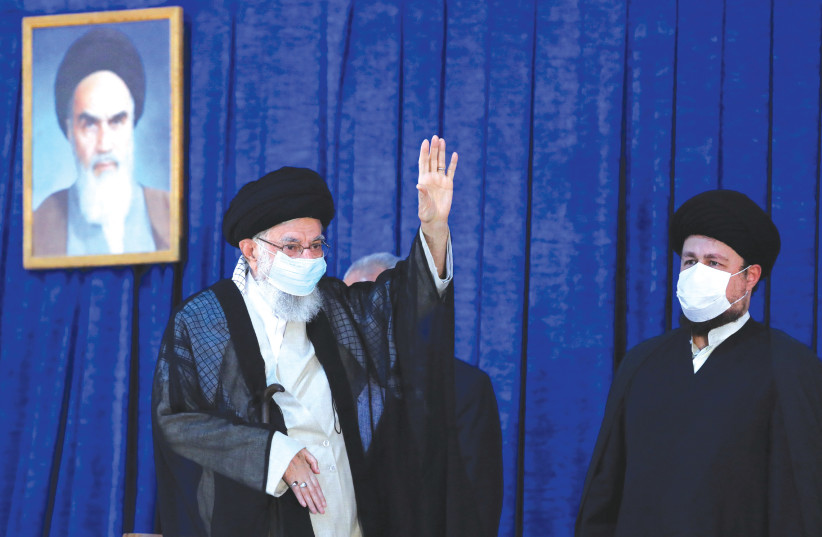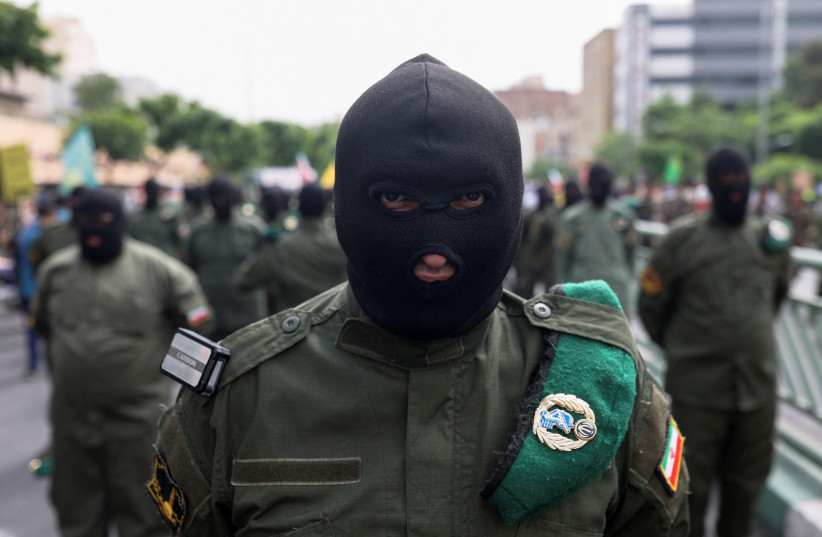The JCPOA’s many flaws were evident from the outset. The deal was signed despite Iranian officials not providing answers to many questions or documents they were asked about.

While there has been reporting that the Biden administration has decided against delisting Iran’s Islamic Revolutionary Guard Corps as a Foreign Terrorist Organization, it is notable that US Special Envoy for Iran Robert Malley made no mention of it in the opening statement of his testimony before the US Senate Foreign Relations Committee on May 25. Instead, he left the unmistakable impression that delisting still could be used as a carrot, if the opportunity presents itself.
Questioned by a committee member about whether IRGC’s FTO designation was a main stumbling block to a renewed deal with Iran, Malley responded, “Well, I think that sticking point has in some ways been resolved in the sense that we’ve made clear to Iran that if they wanted any concession on something that was unrelated to the JCPOA, like the FTO designation, we needed something reciprocal from them that would address our concerns…. Iran has made the decision that it’s not prepared to take the reciprocal steps.”
Leaving that door ajar, Malley also made clear the US has sought “a return to full implementation of the JCPOA,” telling committee members, “At this point it is our assessment… that the nonproliferation benefits of the deal are worth sanctions relief that we would provide.”
Doubts
Senators on both sides of the aisle aren’t the only ones on record questioning that rationale, given Iran’s abysmal record since 2015. Consider Hossein Ronaghi, an Iranian blogger and freedom-of-speech activist, who has written that the IRGC jailed and tortured him “close to death.”

Another op-ed penned by Ronaghi and published days before the Senate hearing is a human-rights outcry against both delisting the IRGC and the removal of any sanctions.
“The designation of these criminals as terrorists not only limits their access to resources but sends a message that the world is watching, raising the stakes of the regime’s crimes,” Ronaghi wrote in The Wall Street Journal. “As the American president considers removing my captors and the murderers of peaceful protesters from the US sanctions list, let me say clearly: This is not what Iranians want.”
And Ronaghi’s powerful appeal against sanctions-lifting pokes holes in Malley’s analysis of the situation.
“This is our message from inside Iran: Don’t enrich our torturers, don’t capitulate to our captors. You would be sacrificing your own national security and selling out the Iranian people at the same time.”
Hossein Ronaghi
“This is our message from inside Iran: Don’t enrich our torturers, don’t capitulate to our captors. You would be sacrificing your own national security and selling out the Iranian people at the same time,” he declared. “We are willing to live under the economic pressure of sanctions if it weakens the regime holding us hostage and cuts off some of the resources used to jail us, torture us and shoot us in the streets.”
If that isn’t enough to hit pause, any eagerness to revive the 2015 deal should be doused by a recent disclosure that inspectors from the International Atomic Energy Agency – the nuclear watchdog tasked with investigating and verifying Iran’s activities – were themselves victims of the regime’s thuggery.
According to a just-published US State Department report on compliance with arms control and nonproliferation agreements, IAEA inspectors “were subject to inappropriate treatment inconsistent with internationally accepted security practices, such as invasive physical searches, by Iranian security personnel at nuclear facilities in Iran.”
For those who dismiss such abuse as mere cost of doing business with Tehran, the same report notes, “The United States has concluded that serious concerns remained outstanding regarding possible undeclared nuclear material and activities in Iran.”
According to the document, “Iran had not provided technically credible or satisfactory answers to the IAEA’s questions” regarding three locations.
A recent news report also revealed that Iran, two decades ago, secured access to IAEA secret documents to misdirect inspections and conceal violations.
What’s more, we learn from the State Department report that the US “continues to assess that Iran has not abandoned its intention to conduct research and development of biological agents and toxins for offensive purposes. This is based on a cumulative assessment of current and past Iranian activity and its continued lack of transparency.”
These revelations come to light just as the JCPOA’s constraints on advanced centrifuge installation begin disappearing in 2024, according to testimony also presented to the Foreign Relations Committee by the Foundation for Defense of Democracies, a research institute that has advised the Bush, Obama, Trump and Biden administrations.
“Breakout time actually drops to less than a month by 2027 and to near zero after that, and after 2031 under the agreement, Iran’s nuclear program can legally expand and harden in multiple sites across the country,” stated FDD’s chief executive, Mark Dubowitz. “By 2031, the ban on Iran producing weapons-grade enriched uranium will be gone.”
A report the FDD prepared for the committee also underscores concerns over Russia’s potential role as steward of Iran’s nuclear program under a revived deal, noting, “Unlike the JCPOA, no new deal should send Iranian fissile material to Russia. That would give Putin an instrument of nuclear blackmail he would be sure to leverage.”
The JCPOA’s many flaws were evident from the outset. The deal was signed despite Iranian officials not providing answers to many questions or documents they were asked about, leaving open the question of how much nuclear progress Iran had made.
Outcome: Without a verifiable baseline, inspectors have been unable to properly evaluate Iran’s compliance.
And it was signed with the US bowing to Iranian demands during the nuclear negotiations not to include ballistic missiles as part of the final deal.
Outcome: Iran recently unveiled a long-range missile “domestically manufactured by the Revolutionary Guards [IRGC]” – according to Iranian state media – that is capable of striking Israel even while indirect talks between Washington and Tehran to restore the 2015 nuclear agreement proceeded in Vienna.
And merely months after the deal was inked, Iran test-fired two missiles with a reported range of 1,200 miles and penned an endearing message in Hebrew along the length of its ballistic missile that read, “Israel must be wiped off the face of the earth.”
In a magnificent display of acrobatic reasoning, proponents of a deal with Iran would have us believe Tehran’s sincerity in adhering to any part of an agreement, but not believe its repeated promise to eliminate the State of Israel.
Our retrospective view should puncture any previously held hope that the world will be safer with a deeply flawed nuclear deal, whether the original one or a similar retread.
With a nod to this harsh reality, the FDD’s report outlines a number of policy prerequisites to forging any accord. Among them are eliminating sunset provisions and closing the deal’s gaping holes regarding inspections, missile development, support for terrorism and human-rights abuses.
It also pushes against lifting terrorism sanctions, as has been suggested, on the Iranian entities that are “key financiers” of the IRGC and its “role as a bulwark of the Iranian economy” – the Central Bank of Iran, National Iranian Oil Company, and National Iranian Tanker Company.
And crucially, the report calls for submitting a much stronger accord, along with any side deals, to the Senate for ratification as a formal treaty, which would necessitate a bipartisan consensus on its merits and make it far less susceptible to cancellation, it opines.
With broadened knowledge in hand, our collective conscience should not allow us to agitate for anything less.
The writer is an award-winning reporter who earned a master’s degree from the Harvard Kennedy School as the recipient of a journalism fellowship. She was a correspondent for The Boston Globe for six years and has worked for other media outlets, including The Associated Press.
Content retrieved from: https://t.co/VNm8lwbrpC.